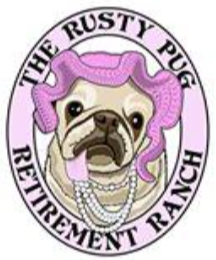"Ditch the Diapers"
Excerpts from A Great Post
by Lisa Smith Weber
Printer friendly PDF version:
It can happen suddenly, an accident, injury or major illness — but more often it happens slowly, gradually. Your older pug wets the bed a little overnight. They may have a bowel movement when they get really excited. You may notice more accidents in the house from a dog that has always been well housebroken. In males, they will often start to urinate consciously, but then walk away before they are done, leaving a little trail behind them. They start to smell bad, and their bedding does too. Eventually things get worse and worse.
You visit the vet, who checks your dog for a urinary tract infection and/or bladder stones. Either the test comes back negative, or if it is positive and they are treated, they continue to have leakage and accidents. Your vet may tell you your pug is getting older. They may give you a medication like Proin to help tighten the urinary sphincter and delay the inevitable. After that, they will likely recommend diapers... but diapers may only intensify your dog’s problems with incontinence.
Incontinence is a deal-breaker for many pet owners. Once their dog is unable to control their bladder or bowels, many owners choose to euthanize. Others consign the dog to a life outside where they won’t mess up the house. For a pug, a breed that lives to be close to their human, that can be even worse than death.
Some owners heroically try diapers and belly bands, lining the beds with plastic and old towels or urine pads. But slowly it gets worse: the dog begins to develop stones and chronic or recurring UTIs. They need multiple baths a day to avoid odors. The dog begins to look uncomfortable. Their energy level is poor; their eyes speak of discomfort and pain. The chronic / resistant UTIs can go systemic and cause the dog to become very ill. Stones can cause blockages that are deadly if not quickly treated. Eventually it ends... badly.
But it doesn’t have to happen like this: Incontinence can be managed. Your dog can live with great urinary health and comfort, your home can be clean, and you don’t need to constantly mop up accidents and urine and wash beds multiple times per day.
Why doesn’t your vet tell you? Sometimes they just don’t know. Managing the chronic conditions of geriatric dogs beyond the pill is not heavily emphasized in vet school. They often don’t have much practice at it, so don’t know what works well. Most of all, they sell owners short: Rightly or wrongly, they assume we don’t have the dedication and commitment required.
I’m going to do my best to teach you. I want you and your dog to have a wonderful life—and I want incontinence to not be the problem that parts you.
First, we have to do away with some common misconceptions:
You visit the vet, who checks your dog for a urinary tract infection and/or bladder stones. Either the test comes back negative, or if it is positive and they are treated, they continue to have leakage and accidents. Your vet may tell you your pug is getting older. They may give you a medication like Proin to help tighten the urinary sphincter and delay the inevitable. After that, they will likely recommend diapers... but diapers may only intensify your dog’s problems with incontinence.
Incontinence is a deal-breaker for many pet owners. Once their dog is unable to control their bladder or bowels, many owners choose to euthanize. Others consign the dog to a life outside where they won’t mess up the house. For a pug, a breed that lives to be close to their human, that can be even worse than death.
Some owners heroically try diapers and belly bands, lining the beds with plastic and old towels or urine pads. But slowly it gets worse: the dog begins to develop stones and chronic or recurring UTIs. They need multiple baths a day to avoid odors. The dog begins to look uncomfortable. Their energy level is poor; their eyes speak of discomfort and pain. The chronic / resistant UTIs can go systemic and cause the dog to become very ill. Stones can cause blockages that are deadly if not quickly treated. Eventually it ends... badly.
But it doesn’t have to happen like this: Incontinence can be managed. Your dog can live with great urinary health and comfort, your home can be clean, and you don’t need to constantly mop up accidents and urine and wash beds multiple times per day.
Why doesn’t your vet tell you? Sometimes they just don’t know. Managing the chronic conditions of geriatric dogs beyond the pill is not heavily emphasized in vet school. They often don’t have much practice at it, so don’t know what works well. Most of all, they sell owners short: Rightly or wrongly, they assume we don’t have the dedication and commitment required.
I’m going to do my best to teach you. I want you and your dog to have a wonderful life—and I want incontinence to not be the problem that parts you.
First, we have to do away with some common misconceptions:
|
c 2016 Lisa Weber Smith, Rusty Pug Retirement Ranch
Some of the supplements Lisa has used in her own dogs appear at: http://www.amazon.com/gp/registry/wishlist/104M0QBM5XSWW/ref=cm_wl_rlist_go_v/166- 4175906-3171448 Please consult your dog’s veterinarian regarding use of these supplements.
Some of the supplements Lisa has used in her own dogs appear at: http://www.amazon.com/gp/registry/wishlist/104M0QBM5XSWW/ref=cm_wl_rlist_go_v/166- 4175906-3171448 Please consult your dog’s veterinarian regarding use of these supplements.
